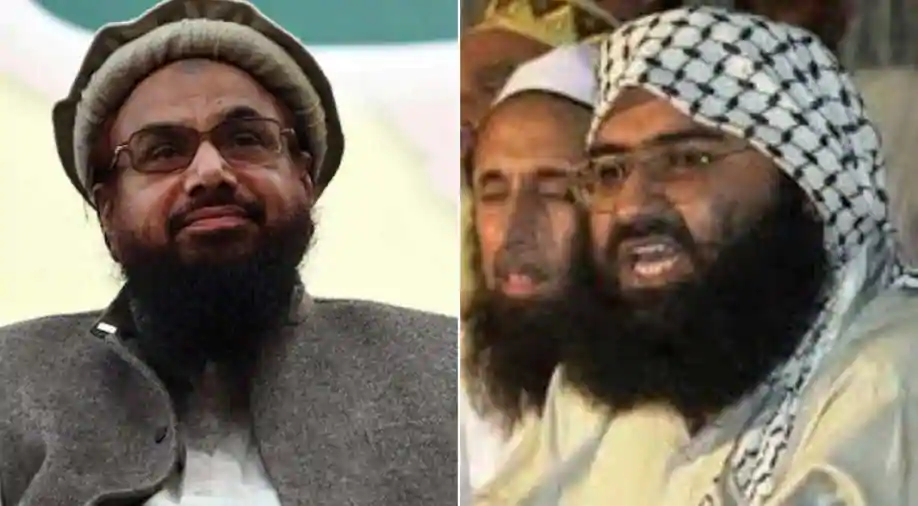
SOURCE : WION
Seeking to wriggle out of the FATF’s grey list, Pakistan has imposed tough financial sanctions on 88 banned terror groups and their leaders, including Hafiz Saeed, Masood Azhar and Dawood Ibrahim, by ordering the seizure of all of their properties and freezing of bank accounts, a media report said on Saturday.
The orders, which were made public late on Friday, identified dozens of individuals, including the Taliban’s chief peace negotiator Abdul Ghani Baradar and several members of the Haqqani family, including Sirajuddin, the current head of the Haqqani network and deputy head of the Taliban.
The list of sanctioned groups included others besides the Taliban and were in keeping with a five-year-old United Nations resolution sanctioning the Afghan group and freezing their assets.
The Paris-based Financial Action Task Force (FATF) had put Pakistan on the “grey list” in June 2018 and asked Islamabad to implement a plan of action by the end of 2019, but the deadline was extended later due to COVID-19 pandemic.
Ibrahim, who heads a vast and multifaceted illegal business, has emerged as India’s most wanted terrorist after the 1993 Mumbai bombings.
The Pakistan government has proscribed 88 leaders and members of terrorist groups, in compliance with the new list issued by the United Nations Security Council (UNSC) recently.
The notifications announced sanctions on key figures of terror outfits such as the Jamaat-ud-Dawa (JuD), JeM, Taliban, Daesh, Haqqani Group, al-Qaeda, and others.
The government ordered the seizure of all movable and immovable properties of these outfits and individuals, and freezing of their bank accounts, the report said.
These terrorists have been barred from transferring money through financial institutions, purchasing of arms and travelling abroad, it said.
The notifications ratified a complete ban on all leaders and members of defunct Tehreek-e-Taliban Pakistan (TTP) hiding in the Pakistan-Afghanistan border areas.
Many of Taliban leaders, including those heading the much-feared Haqqani network, have lived in Pakistan since the 1980s, when they were part of the Afghan mujahedeen and allies of the United States to end the 10-year invasion of Afghanistan by the former Soviet Union. It ended in February, 1989.
Pakistan has denied giving sanctuary to the Taliban following their ouster in 2001 by the US-led coalition but both Washington and Kabul routinely accused Islamabad of giving them a safe haven.
The UNSC Sanctions Committee deals with sanctions on entities and individuals declared as terrorists. All states, including Pakistan, are bound to implement the sanctions which include assets freeze, an arms embargo, and travel ban.
It is believed that the latest move by the Pakistan government is part of its efforts to wriggle out of the grey list of the global money laundering and terrorist financing watchdog FATF.
On August 12, Pakistan Parliament’s lower house passed four bills related to the tough conditions set by the FATF after the government and the Opposition reached a consensus.
The legislation was part of the efforts by Pakistan to move from the FATF’s grey list to the white list.
In its third and final plenary held virtually due to the COVID-19 pandemic in June, the FATF decided to keep Pakistan in the “grey list” as Islamabad failed to check the flow of money to terror groups like Lashkar-e-Taiba (LeT) and Jaish-e-Mohammed (JeM). The plenary was held under the Chinese Presidency of Xiangmin Liu.
With Pakistan’s continuation in the ‘grey list’, it will be difficult for the country to get financial aid from the IMF, World Bank, ADB, and the European Union, thus further enhancing problems for the nation which is in a precarious financial situation.
If Pakistan fails to comply with the FATF directive by October, there is every possibility that the global body may put the country in the ‘Black List’ along with North Korea and Iran.
The FATF is an inter-governmental body established in 1989 to combat money laundering, terrorist financing, and other related threats to the integrity of the international financial system.
The FATF currently has 39 members including two regional organisations, the European Commission and Gulf Cooperation Council.






